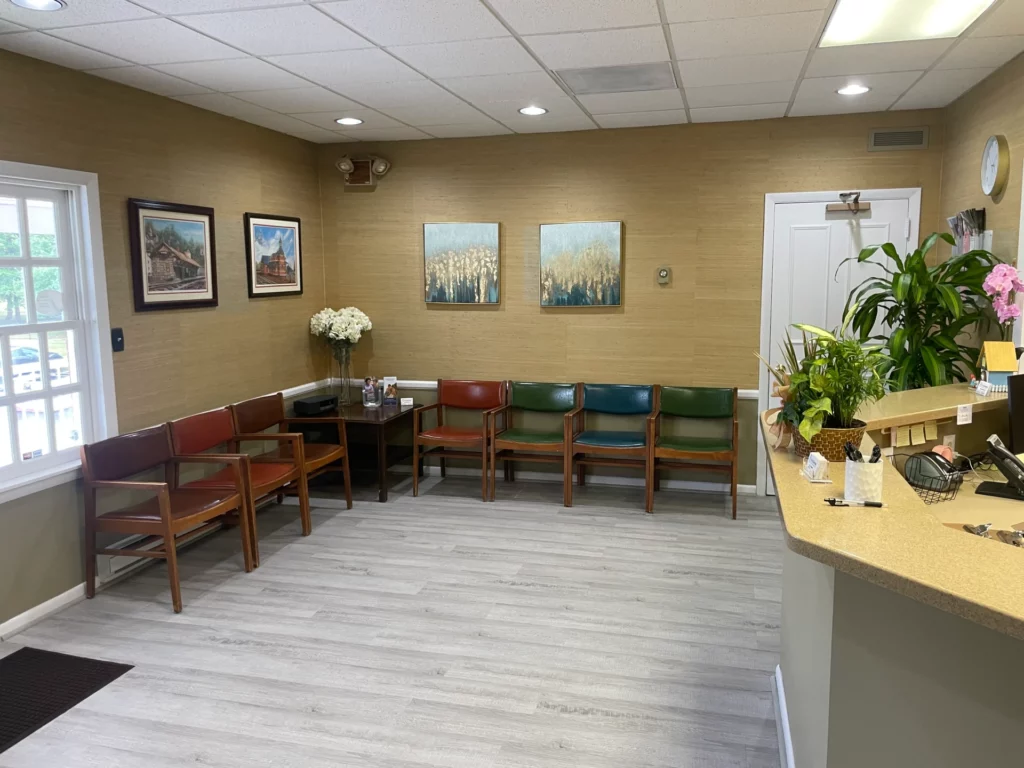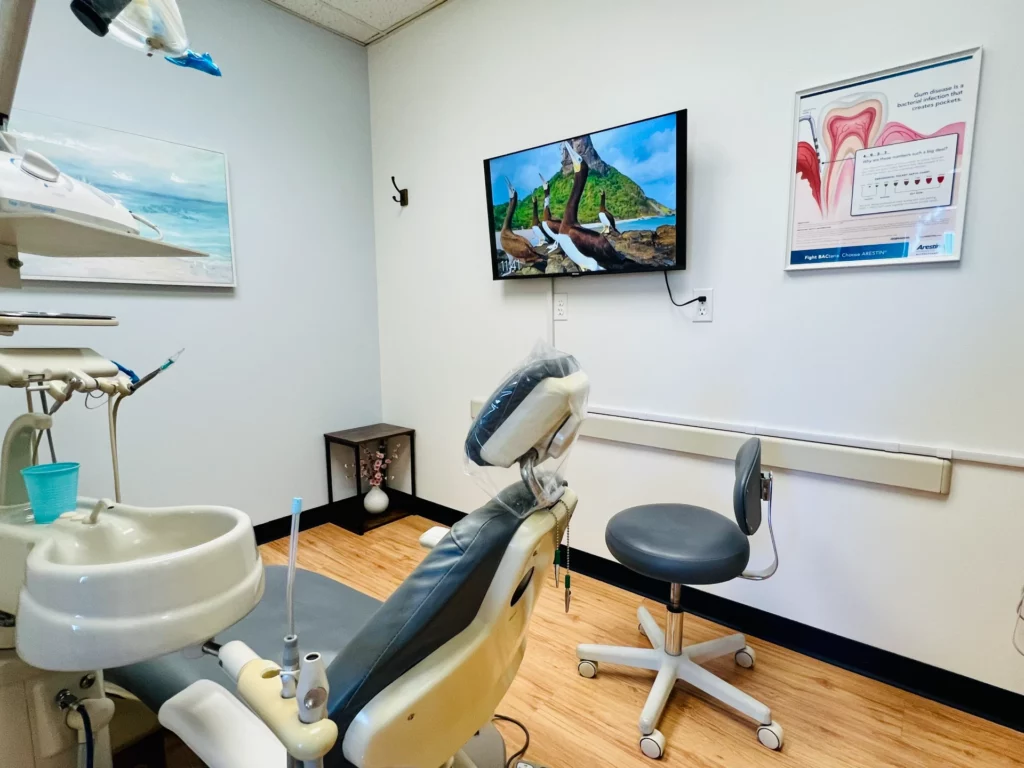A root canal is a very common dental procedure performed in order to help save your natural teeth and prevent the need for dental implants and bridges.
At the center of each of your teeth is the dental pulp (tooth nerve). Infection of the dental pulp can be very painful and is caused by a variety of factors including: trauma, deep cavities, cracks in the tooth, or repeated dental procedures.
If you do find yourself with a painful toothache, we encourage you to call our dental office right away. An infected tooth that is not treated can only result in bigger problems. Contact Route 40 Family Dental at (410) 465-1868 for prompt and comfortable emergency care.
The nerve of a tooth functions to provide hot and cold sensation, but other than that, it is not necessary to the tooth’s overall health and function.
If a tooth has a large cavity or is cracked, bacteria can enter the dental pulp and cause an infection. If not treated, that infection can cause an abscess, resulting in pain, swelling, and further deterioration of the tooth. Not only can the infected tissue injure your jawbones and surrounding teeth, it can also be detrimental to your overall health.
Teeth that need root canal therapy are not always painful, but common symptoms of an infected pulp include: biting pain, visible swelling, obvious damage or decay to the tooth, temperature sensitivity, lingering or spontaneous pain, discoloration of the tooth, discomfort that wakes you up in the middle of the night, or tenderness in the neighboring gums.
Root canal treatment is completed utilizing local anesthesia where the doctor removes the diseased nerve from the tooth. After the infected tissue is removed, the tooth is cleaned and sealed. Next, the tooth is built up with white filling material. A crown is typically placed over the large filling in order to protect the tooth and help prevent future breakage.
While many teeth can be saved with root canal therapy, some teeth do require extraction if the chances of success with endodontic treatment are unfavorable or if complications become evident during or after treatment.
There are several signs that may indicate you need a root canal, including:
If you experience any of these symptoms, it’s important to give Route 40 Family Dental a call as soon as possible. Dr. Lee will examine your tooth and determine if a root canal is necessary to save the tooth and prevent further complications.
If you’re looking for a root canal dentist near you, you’re in the right place! Dr. Lee specializes in root canals and is conveniently located right here in Ellicott City. We reserve space on our schedule for emergency dental appointments, so if you need an emergency root canal near you, we’ll make sure to get you in ASAP!
If you have an emergency after hours call or text our emergency line at (202) 618-2531.
After an emergency root canal procedure, it is normal to experience some pain and discomfort for a few days. However, there are several things you can do to manage your symptoms and promote healing:
If you experience severe pain, swelling, or bleeding after a root canal procedure, or if your symptoms do not improve after a few days, please contact Route 40 Family Dental and we will address your concerns right away.
Root canal recovery time can vary depending on the severity of the infection, the complexity of the procedure, and the individual’s overall health. In general, it’s common to experience some pain and discomfort for a few days after the procedure.
Most people are able to return to their normal activities, including work or school, within a day or two after the procedure. However, it is recommended to avoid strenuous physical activity for a few days and to eat soft foods to avoid putting pressure on the affected tooth.
Common symptoms of root canal recovery include:
In most cases, the tooth will feel completely normal within a few days to a week after the root canal procedure. It’s important to attend follow-up appointments to ensure proper healing and to address any concerns or issues that may arise.
A root canal crown, also known as a dental crown, looks like a natural tooth and is typically made of ceramic, porcelain, or a combination of materials such as porcelain fused to metal. The crown is placed over the remaining portion of the natural tooth after a root canal procedure to protect the tooth and restore its shape and function.
The crown is custom-made to match the shape, size, and color of your natural teeth and is designed to blend in seamlessly with your smile. Dr. Lee will take impressions of your teeth to ensure that the crown fits perfectly and looks natural.
Root canal crowns typically cover the entire tooth, from the gum line to the top of the tooth. They are often used to restore damaged or decayed teeth or to protect weak or cracked teeth from further damage.
Once the crown is placed, it is cemented onto the remaining portion of the natural tooth and becomes a permanent part of your smile. With proper care, a root canal crown can last for many years and provide a natural-looking and durable solution for restoring your smile.
Avoiding a root canal involves maintaining good oral hygiene and taking care of your teeth and gums. Here are some hygiene tips that can help you avoid a root canal:
By following these hygiene tips, you can help prevent the need for a root canal and maintain a healthy smile.
While root canal procedures are often the best option for saving a severely damaged or infected tooth, there are a few alternatives to root canals that may be considered depending on the individual case. These alternatives include:
It’s important to note that while these alternatives may be considered in some cases, a root canal is often the most effective way to save a damaged or infected tooth and prevent the need for an extraction. If you’re experiencing dental pain or other symptoms, please call Route 40 Family Dental right away and Dr. Lee will be able to determine the best course of treatment for your individual case.
Many people ask if root canals are painful. The answer is that while the procedure itself is not painful, some patients may experience some discomfort or sensitivity during or after the procedure.
During a root canal procedure, Dr. Lee will numb the area around the affected tooth with a local anesthetic. This helps to prevent pain during the procedure. Some patients may feel a slight pressure or vibration during the procedure, but it should not be painful.
After the procedure, it is common to experience some discomfort or sensitivity in the treated tooth for a few days. This can usually be managed with over-the-counter medications, such as ibuprofen or acetaminophen. Dr. Lee may also prescribe medication if necessary.
Overall, while a root canal procedure may be uncomfortable or cause some sensitivity, it should not be painful. The benefits of saving a damaged or infected tooth through a root canal procedure far outweigh any temporary discomfort.
Our patients are our biggest fans. Here are a few highlights from our public reviews.
9141 Baltimore National Pike
Second Floor
Ellicott City, MD 21042
Located above St. John’s Jewelers
Monday
8:00AM – 6:00PM
Tuesday
9:00AM – 6:00PM
Wednesday
9:00AM – 6:00PM
Thursday
8:00AM – 3:00PM
Friday
8:00AM – 2:00PM
Saturday
CLOSED
Sunday
CLOSED
We are happy to help you book an appointment or answer your questions. Please fill out our contact form and we will get back to you shortly!


